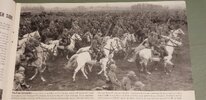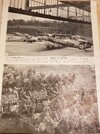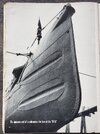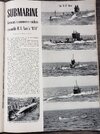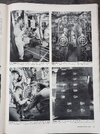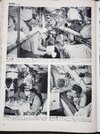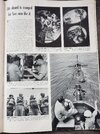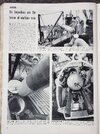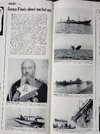A different sort of stash
- Thread starter BarleyBop
- Start date
Littlemarten
Active Member
- Joined
- Dec 1, 2024
- Messages
- 202
What's impressive about this, is the insanely brave photographer who took it.
- Joined
- Sep 4, 2022
- Messages
- 1,667
Yes.the insanely brave photographer who took it.
We can point at the heavy censoring of wartime reporting, the propaganda leverage it was often used for.
But those guys behind the lens, hauling their typewriters, scrawling short dispatches under fire to the folks back home, telling the stories best they knew how... blows my mind.
- Joined
- Sep 4, 2022
- Messages
- 1,667
Littlemarten
Active Member
- Joined
- Dec 1, 2024
- Messages
- 202
Horses are remarkably fragile creatures, far more fragile than their human riders (contrary to what you saw in the movies in the 60s. Their advantage in a relatively modern (WWI & WWII) is that they don't run on a petroleum product. But they don't do well when used against machine guns or effective massed fire. (Agincourt, Crecy—apparently the Poles never got the memo.)
- Joined
- Sep 4, 2022
- Messages
- 1,667
True about the vulnerability of our faithful steeds.contrary to what you saw in the movies in the 60s
I was thinking more along the lines of never seeing them in WW2 movies, just jeeps, planes, tanks and battleships!
Littlemarten
Active Member
- Joined
- Dec 1, 2024
- Messages
- 202
After horses ceased being a major form of motive power, they became much less plentiful, one could almost say rare. I recall westerns from when I was a kid in which a "herd" was somewhere around thirty—or less.
- Joined
- Aug 25, 2024
- Messages
- 254
WWII was the first largely mechanized war.True about the vulnerability of our faithful steeds.
I was thinking more along the lines of never seeing them in WW2 movies, just jeeps, planes, tanks and battleships!
The fact was, that the German army still used equines for major transport duties... Antiquated for the time... And they lost the war. Poland was a equine tragedy.
But Germany's loss of the war really wasn't about horses, it was about large bodies of water. If it wasn't for Britain being an island, the German army would have conquered Britain in days or weeks after Germany took France. Thank God that Germans aren't known for being excellent sailors.
If it wasn't for two large oceans between Europe and the US / Canada, and between Japan and the US / Canada; North America would have fallen also.
There were too many bleeding hearts in the US to join the war before the Japanese attack on Pearl Harbor. That fact almost cost the world. Seriously, the entire world. And would have let the AXIS powers win and dictators rule.
In retrospect... it sounds too familiar in today's news. The very same country (China) that we, the allies, helped to extricate the tyrant Japanese forces 70 or 80 years ago... is now the free worlds threat.
Last edited:
Jakko
Well-Known Member
- Joined
- Oct 9, 2024
- Messages
- 809
Or: it's staged. Get a few soldiers into a ruined wood, throw some smoke, take a few pictures.What's impressive about this, is the insanely brave photographer who took it.
I'm sure you've seen this footage before:
This gets shown in pretty much every documentary about the First World War, and usually as authentic combat footage. But it's staged, too, to the best of my knowledge. The soldier who slides back down the trench side isn't shot, IIRC he just slipped and played dead.
Jakko
Well-Known Member
- Joined
- Oct 9, 2024
- Messages
- 809
That makes it seem like you think going to war is generally a good idea. Yes, the USA came out of the Second World War better and more powerful than it went into it, but this is very much the exception, and has only a few other examples in history (the Eighty Years War being another one, which comes to my mind easily because I happen to live in the country that came out far better off than it went into that one).There were too many bleeding hearts in the US to join the war before the Japanese attack on Pearl Harbor.
Quite probably, Nazi Germany would have been defeated by the Soviet Union even without American aid. But, of course, that would also have lead to a world, or at least a Europe, ruled by a single dictator, and it's very debatable whether the average person would have been better off under Nazism or Stalinism.That fact almost cost the world. Seriously, the entire world. And would have let the AXIS powers win and dictators rule.
Is it the same country, though? I'd say the China that was saved in 1945 is now limited to controlling Taiwan, since the principal ally of the western world back then was the Kuomintang, who lost the Chinese Civil War to the Communist side and then withdrew to Taiwan.The very same country (China) that we, the allies, helped to extricate the tyrant Japanese forces 70 or 80 years ago... is now the free worlds threat.
- Joined
- Sep 4, 2022
- Messages
- 1,667
Pvt. Mark Hitchcock: (The rat patrol)
"Who was there, Sarge? You or me?"
I'll let a war correspondent have his word:
https://legionmagazine.com/the-first-casualty-media-independence-in-war/
I still intend a tribute though, gathering material for the eventual build:

"Who was there, Sarge? You or me?"
I'll let a war correspondent have his word:
https://legionmagazine.com/the-first-casualty-media-independence-in-war/
I still intend a tribute though, gathering material for the eventual build:

- Joined
- Aug 25, 2024
- Messages
- 254
"That makes it seem like you think going to war is generally a good idea." - Jakko.That makes it seem like you think going to war is generally a good idea. Yes, the USA came out of the Second World War better and more powerful than it went into it, but this is very much the exception, and has only a few other examples in history (the Eighty Years War being another one, which comes to my mind easily because I happen to live in the country that came out far better off than it went into that one).
Quite probably, Nazi Germany would have been defeated by the Soviet Union even without American aid. But, of course, that would also have lead to a world, or at least a Europe, ruled by a single dictator, and it's very debatable whether the average person would have been better off under Nazism or Stalinism.
Is it the same country, though? I'd say the China that was saved in 1945 is now limited to controlling Taiwan, since the principal ally of the western world back then was the Kuomintang, who lost the Chinese Civil War to the Communist side and then withdrew to Taiwan.
No, I don't think it is a good idea. It is sometimes a needed plan. And war is a necessity for Freedom. To maintain freedom in a world that people want to control.
I would love to sit down and have an in person discourse with you @Jakko. And with @BarleyBop, and some others on this forum. Like the Aussies and Kiwis and Brits in North Africa did so very many years ago over brewing with a hidden campfire. With a few Free French and others thrown in just for color in accents and the- bound to happen mild drama. Sit in a pub and drink a couple sodas and talk smack about life, lost models or girls, and the art of model building. And freedom and politics. It's easy to hate the Ami. That's popular stuff.
Anyway, That pub hangout is not going to happen. But I think that we all agree more than we disagree.
I have to apologize to @BarleyBop, because my response was initially about horses used historically by the Wehrmacht. And it turned into a world domination twist because I do get into ranting. My apologizes to all.
So, onward with Barley's stash...
Last edited:
- Joined
- Sep 4, 2022
- Messages
- 1,667
Accepted, @OldManModeler .
I like the campfire idea, but I think I'll pass on the bully beef and hard tack!
Better to dine al fresco as the Italian officers, described in Alan Moorhead's enthralling 'The Desert War':
I like the campfire idea, but I think I'll pass on the bully beef and hard tack!
Better to dine al fresco as the Italian officers, described in Alan Moorhead's enthralling 'The Desert War':
We sat down on the open sand and ate from stores of bottled cherries and greengages; great tins of frozen hams and anchovies; bread that had been baked somehow here in the desert; and wines from Frascati and Falerno and Chianti, red and white, and Lacrimae Christi from the slopes of Vesuvius above Naples. There were wooden casks of a sweet, heady, fruity brandy, and jars of liqueurs of other kinds wrapped carefully in envelopes of straw. For water the Italians took bottles of Recoaro minerals—the very best in Italy—and these, like everything else, had been carted out to them in hundreds of cases across a thousand miles of sea and desert by ship and car and mule team.
Littlemarten
Active Member
- Joined
- Dec 1, 2024
- Messages
- 202
Or: it's staged. Get a few soldiers into a ruined wood, throw some smoke, take a few pictures.
I'm sure you've seen this footage before:
This gets shown in pretty much every documentary about the First World War, and usually as authentic combat footage. But it's staged, too, to the best of my knowledge. The soldier who slides back down the trench side isn't shot, IIRC he just slipped and played dead.
Yes, and there are significant "tells" in the footage. Much easier to fake a still shot.
Littlemarten
Active Member
- Joined
- Dec 1, 2024
- Messages
- 202
There is a book you might like: Pig Boats, by Theodore Roscoe. It is a history of the submarine war against Japan. It is a shorter version of the official version written for and published by the Naval Institute Press. I have both. Fascinating reading.
Jakko
Well-Known Member
- Joined
- Oct 9, 2024
- Messages
- 809
I have a 1917 book that describes the exploits of a German submarine between 12 and 30 April 1916. It's — naturally — propaganda (though my copy is a Dutch translation published in Amsterdam) to show how well the submarine service was doing, but interesting reading nonetheless. The title translates as "War diary of U 202" by Kapitänleutnant Freiherr Spiegel von und zu Peckelsheim, but the afterword indicates that "U 202" is a fictional number to hide that of the real boat.
- Joined
- Sep 4, 2022
- Messages
- 1,667
10 smackers for a used copy on I'm-a-zoo, how could I resist!Pig Boats
The only thing worse than having a quick 'BUY' trigger finger, is having other folks help you pull it!


